July marked the start of free agency in the National Basketball Association, when some of the biggest names in the league test the market to see how much of a payday they can get by switching teams.
For New York’s commercial real estate brokers, though, free agency happens year-round. And as the market has stumbled along and major firms have faced internal turmoil, 2018 has shaped up to be a year like no other for broker moves.
“In my 18 years in the business, I’ve never seen so many people switching,” said James Famularo, who was one of the first brokers from the now-defunct Eastern Consolidated to find a new home when he and his team signed on with Meridian Capital Group in late June.
Although there’s always some level of broker musical chairs, the sheer pace at which some of the industry’s top producers are moving this year is rapidly realigning the landscape in the commercial leasing, investment sales and retail sectors.
In the first half of the year alone, James Nelson defected from Cushman & Wakefield and headed to Avison Young, and top Eastdil Secured hotel broker Larry Wolfe jumped to Newmark Knight Frank.
Meanwhile, David Fowler left HFF to join the powerhouse investment-sales team at CBRE headed by Darcy Stacom and Bill Shanahan. And Gene Spiegelman, a top Cushman retail broker, departed for Ripco Real Estate.
And the list goes on: In April, Tishman Speyer hired away 30-year Cushman veteran Gus Field, and longtime RKF brokers Beth Rosen and Spencer Levy left for Ripco and CBRE, respectively. For its part, Avison brought on EVO Real Estate Group’s Todd Korren, and Besen Associates snagged Aldo Advisor’s Alan Miller.
Then, of course, there’s Paul Massey and Bob Knakal. They sold their namesake brokerage to Cushman for $100 million in 2014, but they have since left the global brokerage, which has faced internal turmoil amid the lead-up to its much-hyped initial public offering.
Massey fled Cushman in April and is launching his own shop, B6 Real Estate Advisors, while Knakal is still a free agent. Several sources said Knakal is actively talking to JLL, Colliers International and other brokerages and is also considering either teaming up with Massey again or starting his own business. In addition, Cushman’s remaining Massey Knakal alumni are all known flight risks.
 For top brokers, switching allegiances is often a chance to improve their compensation situation — with more favorable commission splits, stock options or added resources to boost their business. That’s not to mention signing bonuses.
For top brokers, switching allegiances is often a chance to improve their compensation situation — with more favorable commission splits, stock options or added resources to boost their business. That’s not to mention signing bonuses.
But unlike the poaching arms race that’s defined the residential world lately, sources said the current climate in the commercial world is tamer.
They say it’s marked less by firms aggressively and secretly trying to lure agents away with more generous commission splits and compensation packages, and more about brokers deciding they want to take their brand elsewhere.
“We’re in a topsy-turvy time,” said Joe Harbert, president of Colliers’ Eastern region. “I think there’s a general unrest or an uneasiness in the marketplace that’s making brokers think it’s time to reevaluate.”
The incentives race
While the recruitment atmosphere may not be as frenzied as it’s been on the residential side, that doesn’t mean top producers are not wringing perks out of the companies they’re joining.
And, not surprisingly, the signing bonus is meaty broker bait.
“It depends on the talent and how strategic the firm’s being,” said Massey, whose new firm will focus on investment sales and debt brokerage. “A bonus can be in the hundreds of thousands of dollars, or it can be approaching seven figures.”
Sources said Nelson received an undisclosed signing bonus to join Avison Young.
Before leaving Cushman, the veteran broker was actively talking to about a half a dozen firms. And while he declined to comment on the financial terms of his deal with Avison, he said it wasn’t the most lucrative package offered.

(Click to enlarge)
“If I was just going for the biggest offer, I’d be at a different place,” Nelson said, noting that Avison gave him the chance to build his own team and platform.
And he’s doing just that. He brought seven of his team members over from Cushman, and he’s working on growing his group to 30. His pitch, he said, is a shared commission pool.
“People want to work at a collaborative company,” he said.
Signing bonuses, sources said, are generally a function of how much income a broker produces in a year: The bigger the book of business, the bigger the payout.
Doug Harmon and Adam Spies, for example, are rumored to have received a massive signing bonus in 2016 when they jumped to Cushman from Eastdil. But they are the top producing team in the city.
When it comes to commission splits, insiders said there’s less room to negotiate on the commercial side of the business than there is on the residential, where top agents are increasingly landing 80 percent splits.
Sources said 60/40 splits are somewhat standard for senior brokers at commercial firms. While some top brokers have locked in splits up to 70 — or even 75 — percent, it’s not the norm, and 80 percent splits are almost unheard of.
But performance benchmarks — which can push splits up by, say, 5 percent at a time — are more common.
Massey said he’s aiming to bring on 50 agents in two years. He also just signed a lease for a 12,000-square-foot office near Bryant Park and plans to open offices in Brooklyn, Queens and New Jersey as well. But he said the incentives being dangled to recruit residential brokers should serve as a cautionary tale to commercial firms.
“I think the residential competitive war that’s going on is unsustainable, and I think that should be a lesson,” he said.
Massey said his new brokerage is offering the “standard split we’ve been offering for a lot of years” and that his pitch to brokers is that they will have the chance to get in on the ground floor and grow with the company if they come on.
“There’s an opportunity now for a major market-share grab, and you want to be at a firm with major market share,” he said.
Massey declined to comment on his fundraising plans, but sources familiar with his efforts say he’s looking to drum up about $7 million from investors.
With so much upheaval in the market — from Cushman’s imminent IPO to Newmark’s acquisition of retail powerhouse RKF — there is, indeed, a lot on the line. And others are also finding that those realities are making it a ripe time for poaching.
Joel Herskowitz, chief operating officer of Lee & Associates NYC, said his company is bringing on 10 new brokers. But unlike seven years ago, when the mid-market firm set up shop in New York via its merger with Sierra Realty, Herskowitz said this time around he doesn’t have to write very large checks to do so.
“In 2011, we had to offer signing bonuses and premium splits for the first group of brokers we hired,” he said. “It was very expensive.”
Part of the reason that’s changed is because the market is swarming with brokers looking for a shop in the wake of Eastern’s demise; the firm’s announcement in June that it was shuttering unleashed some 100 brokers into free agency.
“I wasn’t looking to move,” said Eastern’s Andrew Sasson, adding that he’s searching for a firm with the right culture. “I don’t want to go to a job and leave in two years.”
Herskowitz noted that one Eastern team he met with said they were “getting offers for a signing bonus of several million and a split of 80 percent.”
But, he added, “Did I believe them? Absolutely not.”
Acquisition alienation
Consolidation in the commercial brokerage world is undoubtedly prompting much of the existing broker reshuffling.
For example, as Robert Futterman, founder of RKF, was finalizing a deal earlier this year to sell his firm to Newmark, some of his top dealmakers were planning their exits.
“I heard a lot of people aren’t embracing this acquisition,” said one industry leader. “Newmark wants all the RKF brokers to sign contracts. That’s a big no-no.”
One source said the firm is requiring contracts that may run as long as five years.
“I don’t think I wanted to leave,” Levy, a 14-year RKF veteran, told Commercial Observer. “With the change that was being thrust upon RKF at the time it opened up opportunity to investigate other things to see what was out there.”
Meanwhile, in June, Rosen, who was one of RKF’s first brokers when she signed on 17 years ago, left for Ripco. And shortly thereafter, RKF’s Emily Simmonds joined her.
Sources told TRD that some RKF brokers have felt alienated not only by Newmark’s contract requirements, but also by its commission policy. The policy — instituted in 2011 when the firm was bought by BGC Partners — requires agents to park a portion of their commission in company stock, which they can’t cash out for a certain period of time.
Sources said those factors are motivating RKF brokers to look for jobs elsewhere.
Colliers’ Harbert said the already heightened environment could escalate if there’s more disruption in the market. “This will be a 12- to 15-month shakeout, and, of course, that depends on the economy staying strong,” he said. “There will be more shakeout if it doesn’t.”
